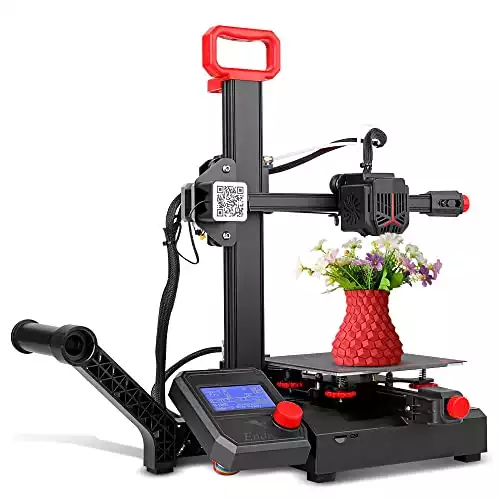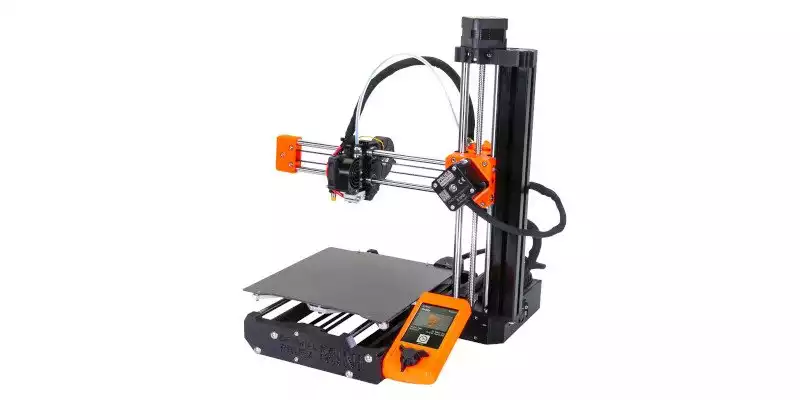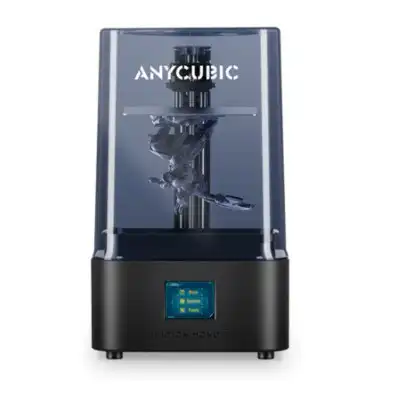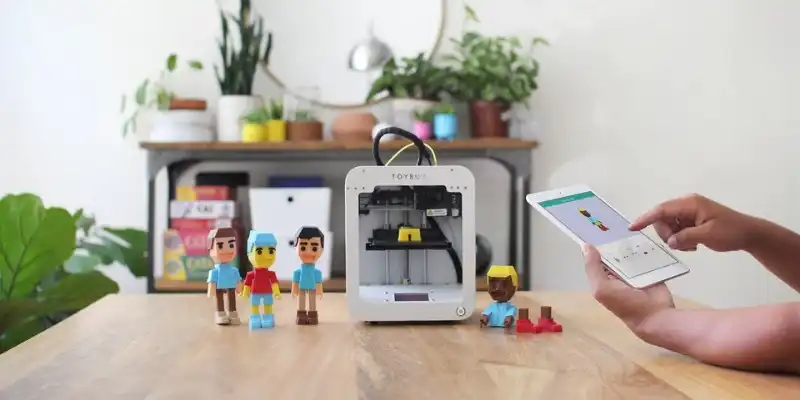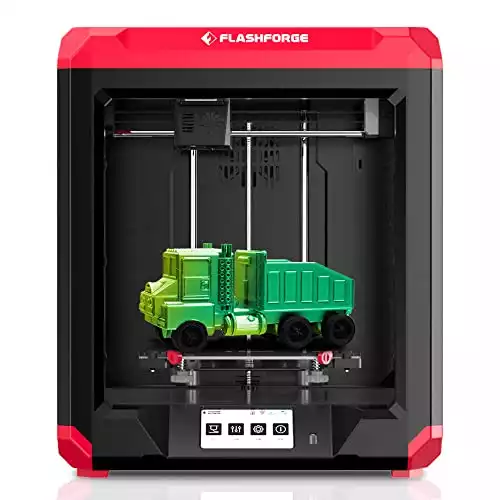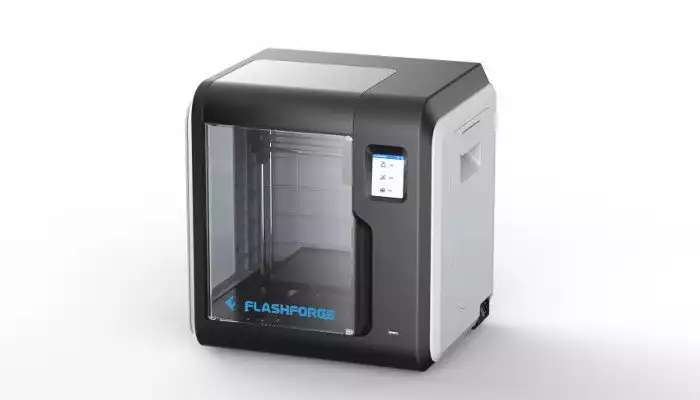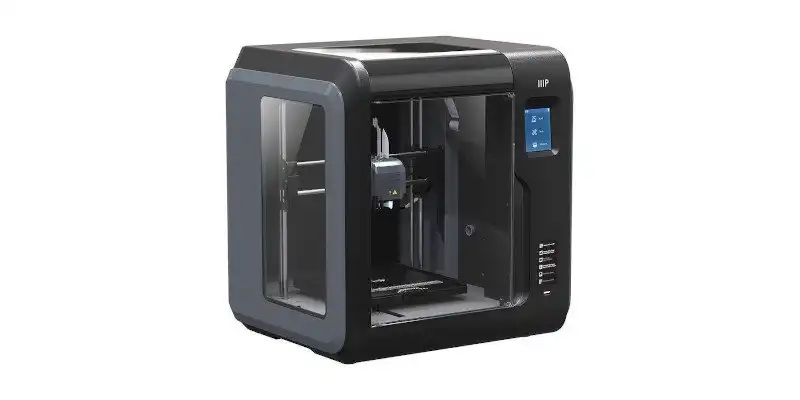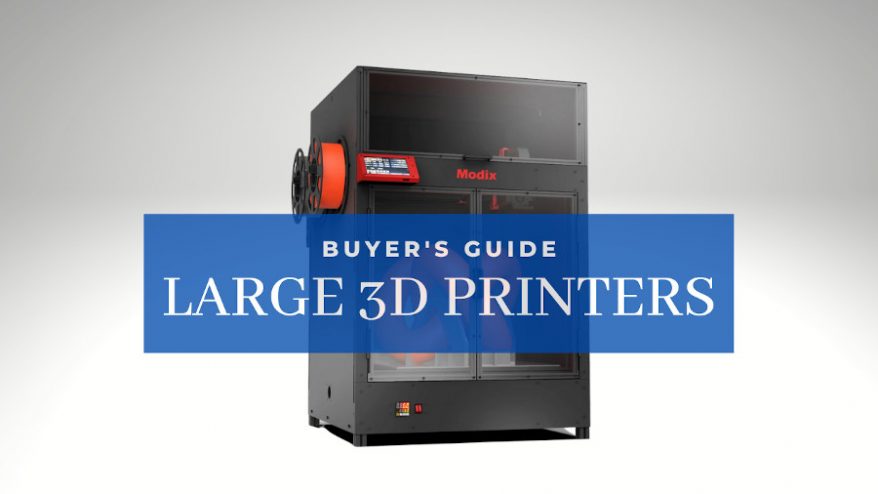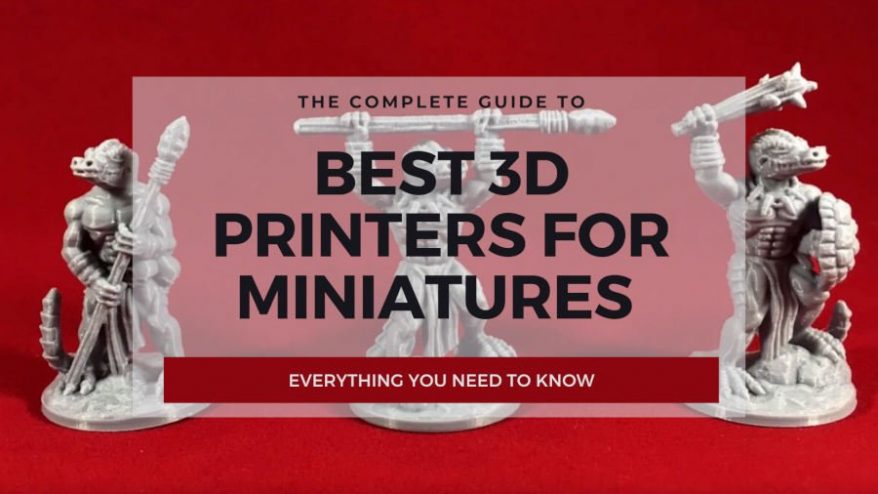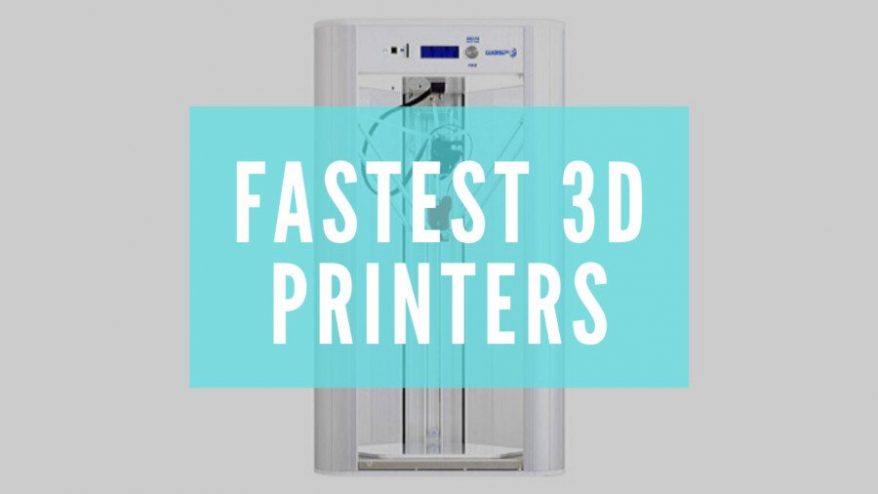Mini 3D printers are small, compact machines designed to fit on your small desktop – even if you live in a tiny apartment. But they still pack a punch and print great quality models. Here’s my top recommendations for the best small 3D printers that are fast, reliable and accurate, despite being low-cost and compact:
The best small 3D printer overall right now is the Prusa Mini+. It’s compact, reliable and precise, and also doesn’t cost too much.
The best mini resin 3D printer is the Anycubic Photon Mono 2. It’s everything you need in a small resin printer, and still offers precise 4K resin quality.
If you’re a complete beginner or want to 3D print with your kids, the Toybox is perfect. The Flashforge Finder 3, and Adventurer 3 are also good picks for smaller 3D printers.
|
|
|
|
|
4.2
|
4.7
|
4.5
|
|
N/A
|
$399
|
$199
|
|
165 x 165 x 180 mm
|
180 x 180 x 180 mm
|
165 x 143 x 89 mm
|
|
421 x 383 x 465 mm
|
380 × 330 × 380 mm
|
390 x 229 x 235 mm
|
|
4.65 kg
|
4.5 kg
|
4 kg
|
|
260°C
|
280°C
|
N/A
|
|
|
|
|
Quick Overview
| Name | Build Volume (mm) | Weight | Price |
|---|---|---|---|
| Creality Ender 2 Pro | 165 x 165 x 180 mm | 4.65 kg | $149 |
| Flashforge Finder 3 | 190 x 195 x 200 | 16.6kg | $299 |
| Anycubic Photon Mono 2 | 165 x 143 x 189 | 4kg | $189 |
| Flashforge Adventurer 3 | 150 x 150 x 150 | 9kg | $299 |
| Prusa Mini+ | 180 x 180 x 180 | 4.5kg | $349 |
| Toybox 3D printer | 70 x 80 x 90 | 6.9kg | $299 |
| Monoprice Voxel | 150 x 150 x 150 | 13kg | $299 |
The Best Mini 3D Printers in 2024 – Full Reviews
1. Ender 2 Pro – Best Budget Mini Option
- Price: Check latest price at Amazon here
- Build volume: 165 x 165 x 180 mm
- Total size/dimensions: 421 x 383 x 465 mm
- Weight: 4.65 kg
- Print speed: 100 mm/s
- Max nozzle temperature: 260°C
- Max heated bed temperature: 80°C
- Filament compatibility: PLA, TPU, PETG
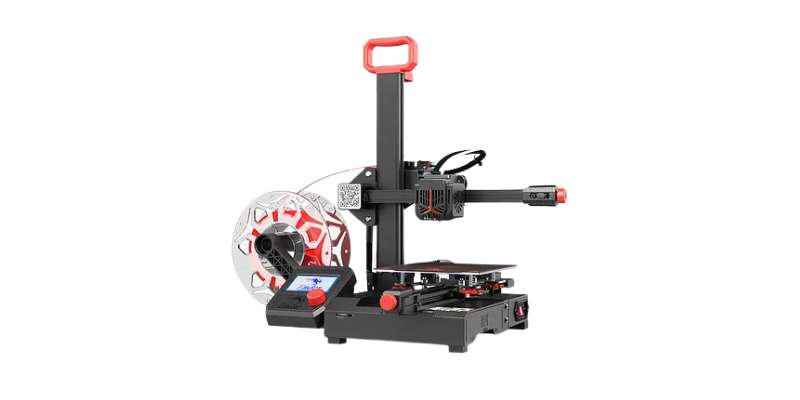
Pros
Small and compact
Easy to assemble
Carry handle
Cons
No automatic bed leveling
No USB or Wi-Fi connectivity
For well under $200, the Ender 2 Pro is a low-cost printer capable of impressive print quality, seamless setup in minutes, and all the fundamentals for a pain-free 3D printing experience.
And all this, in a small machine that weighs less than 4 kg – perfect if you don’t have much space to store or set up your printer. There’s even a built-in carry handle, a removable clip-on screen, and a collapsible spool holder for even easier carrying when you’re taking it on the go. There’s also a removable flexible print bed for easy print removal.
However, when you start to look closer at the Ender 2 Pro, you’ll quickly see where Creality has cut corners to keep both the price and size down.
Among them is manual bed leveling, where most printers now sport some form of automatic bed leveling. Similarly, the Ender 2 Pro’s connectivity is only from an SD card.
Compared to the Prusa Mini+ with its host of features like automatic bed leveling, more filament compatibility, built-in self-diagnostics, and other monitoring gadgets, the Ender 2 Pro is a less sophisticated machine.
The same goes for the FlashForge Finder 3, which comes with even more features like Wi-Fi, swappable nozzles, an enclosure to support a broader variety of materials, and a larger build volume.
This is why the Ender 2 Pro is cheaper than the alternatives. So, if you’re prepared for a more hands-on printing experience then the Ender 2 Pro is a solid option for those on a budget. With a little trial and error, the Ender 2 Pro produces quality prints.
If you’re looking for an even smaller printer, the Toybox is a strong contender, but with its limitations (PLA-only and very much geared towards younger users), the Ender 2 Pro is a much better option for those who want the option to print more ambitious models in a wider variety of materials.
Desktop 3D printer | Easy & quick assembly in 4 steps (arrives 90% pre-installed) | Lightweight at 4.65 kg | Cantilevered design | Built-in power | Resume printing function
2. Prusa Mini – Best Overall
- Price: Check latest price at Prusa Store here
- Build volume: 180 x 180 x 180 mm
- Max nozzle temperature: 280°C
- Heated bed temperature: 100°C
- Compatible Filaments: PETG, ABS, ASA, PLA, Polycarbonate, Nylon, HIPS, PVB, CPE
- Total size: 380 × 330 × 380 mm
- Weight: 4.5 kg
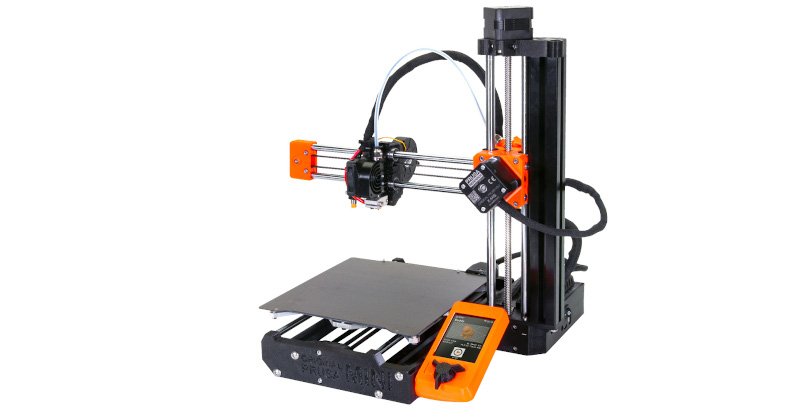
Pros
Reliable and durable, like all prusa printers.
Very fast with speeds up to 200mm/s.
Cons
Less sturdy gantry system than most Cartesian printers.
The Prusa Mini+ offers all the key reliability benefits of the MK3S+ and MK4 range, but at a lower price point and in a more compact package.
With a 180 x 180 x 180 mm max build volume, it’s a portable 3D printer that can fit on most desktops, has mesh bed auto-leveling, and prints with the same 0.05mm precision that the MK3S+ has.
Some differences are that the Mini+ is limited to a 280°C max extruder temperature (the Prusa MK4 has 290°C), and the frame is not as sturdy as the gantry systems on stronger 3D printers. But you can still 3D print standard PLA and ABS, as well as PETG, flexibles and ASA.
The Mini comes with Prusa’s own PrusaSlicer 3D slicer, and if you run into any problems, you can speak with Prusa’s support team 24/7.
Overall, it’s a great lower cost RepRap 3D printer for great quality, reliable prints at a lower price. If you want Prusa quality but for under $500, then the Mini+ is the perfect desktop 3D printer for you.
All the reliability of the Prusa MK3S+ and MK4, but in a cheaper and smaller package.
3. Toybox 3D printer – Best Mini 3D Printer For Kids & Beginners
- Price: Check latest price at Toybox store here
- Max print size: 70 x 80 x 90 mm
- Max nozzle temperature: 220°C
- Heated bed temperature: No heated bed
- Filament compatibility: 1.75 mm PLA
- Total size: 188 x 188 x 231 mm
- Weight: 6.9 kg
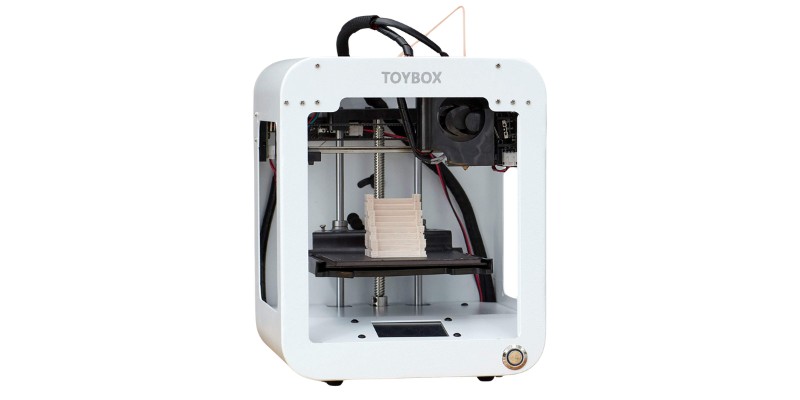
Pros
Comes fully assembled
Huge catalog of free prints
Bendy easy-peel magnetic build plate
No technical skill or knowledge necessary
Cons
Only uses PLA
Tiny print area
For beginners, the Toybox 3D printer is an easy choice. It’s fully assembled out of the box. All you need to do is attach the filament, which Toybox lovingly calls “printer food.”
It’s incredibly easy to use: I was printing with my Toybox 3D printer in under 20 minutes when I tested the Toybox 3D printer.
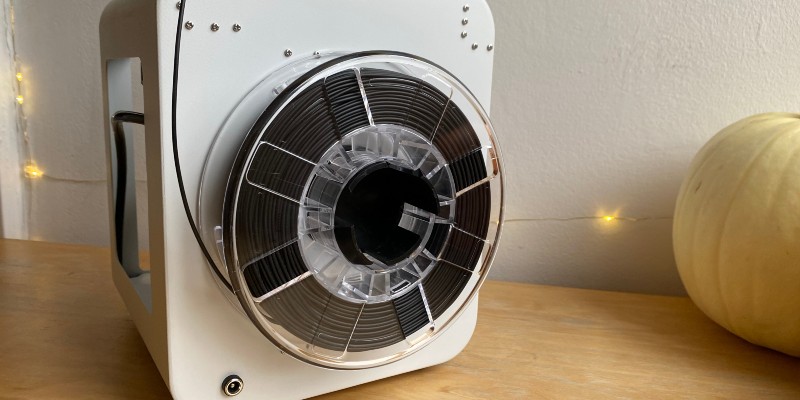
Toybox have even added their own STL file repository, with a huge catalog of free prints available. This includes Batman-related files licensed so you can print your own toys from home!
People can upload and share their own designs, so in practice you have access to even more than the Toybox default designs.
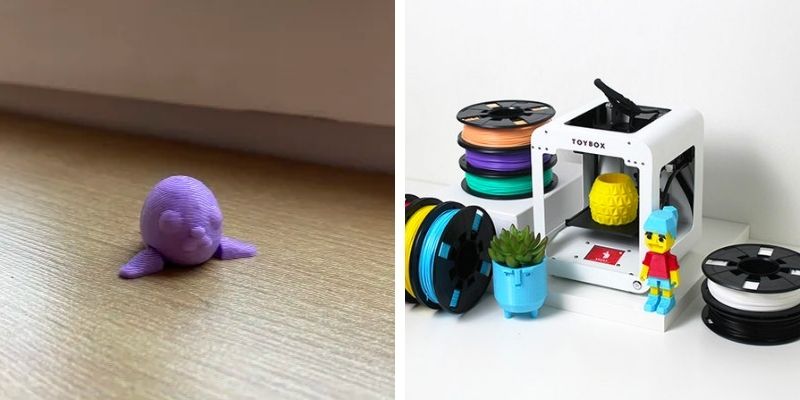
The Toybox tries to remove any potential stumbling blocks. It has both auto-leveling and a bendy easy-peel magnetic build plate. You never need to mess around with hairspray or other ‘hacks’ since you can get designs off your build plate by bending it.
However, one major downside is you can only use PLA, so you’re out of luck if you want to experiment with other filaments like ABS or PETG.
Another downside is the small build size.
As a result, it really is best suited if you’re a beginner, or as a present for your kids. It’s incredibly easy to use and won’t give you any technical issues, but as a result it’s more limited if you want to do more advanced printing.
But as an easy-to-use entry-level tiny 3D printer, it’s ideal.
Super easy to set up, comes with different filament colors to get started, and a huge range of 3D printable files (including licensed Batman models!) that your kids will LOVE.
- Very simple smartphone interface suitable for all ages.
- Fully enclosed design keeps hot parts away from fingers.
- Easy to switch between colors of PLA filament
- Can only print PLA, not higher-temp materials like ABS.
4. Anycubic Photon Mono 2 – Best Mini Resin Printer
- Price: Check latest price at Anycubic store here
- Max print size: 165 x 143 x 189 mm
- Resolution: 6.6 inch 4K+ LCD screen
- Weight: 4kg
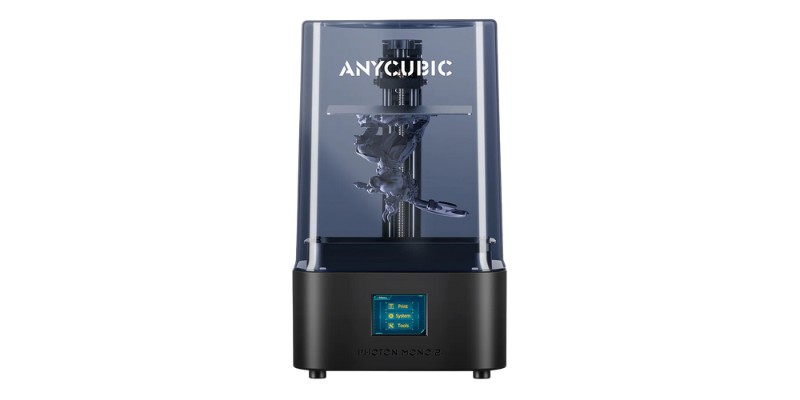
Pros
High resolution as a resin printer
Reputable company
Budget friendly price
Cons
Resin printing requires more know-how than FDM printing
Less beginner friendly
Resin printers come in miniature versions too, and there’s no better company to make them than Anycubic.
The Photon Mono 2 has a 6.6 inch 4K+ LCD screen, covered with an anti-scratch film for a screen protector. Although screen protectors aren’t a necessity, I especially like them for beginners. Accidentally destroying your new expensive printer is a pretty bad introduction to 3D printing.
The Photon Mono 2 has state of the art technology similar to what is included in other, pricier Anycubic printers. They’ve upgraded their LighTurbo light technology, resulting in reduced layer and grid lines. You get a free slicer to boot: Photon Workshop.
It’s easy to make the leap to a bigger Anycubic model from the Photon Mono 2. You can learn all the necessary skills (like calibration and using Photon Workshop) and carry them over to your next printer.
For high-resolution printing, I strongly suggest purchasing the Photon Mono 2 over any FDM printer.
Resin printers are capable of far better precision and model quality than FDM printers, and so if you’re looking to print miniatures or any other similar intricate prints, then go for a resin printer.
And right now the Mono 2 is the best mini low-cost resin printer.
One of the best budget resin 3D printers out right now - ideal for beginners who want a low-cost entry into resin printing. You won't get the same level of quality as in the Elegoo Saturn range, but it's a great starting point.
5. Flashforge Finder 3 – Best Small Enclosed 3D Printer
- Price: Check latest price at Amazon here
- Max print size: 190 x 195 x 200 mm
- Max nozzle temperature: 260°C
- Heated bed temperature: ≤110℃
- Filament compatibility: PLA, PETG, TPU
- Total size: 406 × 416 × 469 mm
- Weight: 16.62 kg
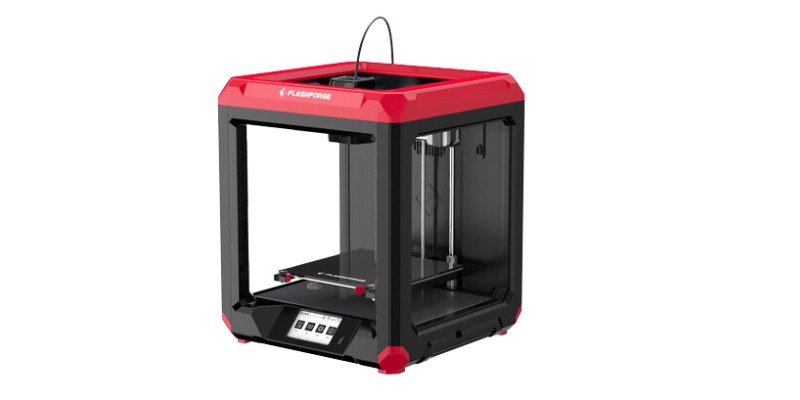
Pros
Huge print volume for a mini 3D printer
Highly temperature resistant nozzle (PTFE-lined hotend)
Built to be quiet
Cons
Pricier option compared to other Finder models
For mini 3D printers at reasonable prices, Flashforge has delivered time and time again.
The newer Finder 3 features auto leveling, a filament runout sensor, and a touchscreen. On top of that, the Finder 3 has an increased print size of 190 x 195 x 200 mm, which is larger than the previous Finder and Finder Lite models.
It even brings back the Wi-Fi that was removed from the Finder Lite. Thankfully, it’s just as quiet as the other Flashforge printers we’ve reviewed – partially thanks to the enclosed design.
The Finder 3 is adjustable to your needs with two options for build plates you can order: glass or magnetic PEI. Glass has better adhesion generally, but the magnetic PEI is a good option for easily popping prints off.
Flashforge doesn’t stop there. There’s also swappable nozzle sizes of 0.3mm, 0.4mm, and 0.6mm, with 0.4mm being the default if you don’t choose another size.
As you might expect, the Finder 3 costs more than previous Finder printers due to the upgrades. But, it’s still cheap and small enough to feature in my recommendations for smaller 3D printers, and it’s a great improvement on the previously popular Finder printers.
This quiet, mini 3D printer boasts a compact 190 x 195 x 200mm build volume. Print confidently with auto bed leveling and runout detection.
Achieve stunning results with swappable 0.3mm, 0.4mm, and 0.6mm nozzles.
Loaded with innovations in a tidy, enclosed body, the Finder 3 delivers bigger, better prints in any space!
6. Flashforge Adventurer 3
- Price: Check latest price at Amazon here / Flashforge here
- Build volume: 150 x 150 x 150 mm
- Print speed: best at around 50mm/s
- Max nozzle temperature: 220°C
- Heated bed temperature: 100℃
- Compatible filaments: PLA, ABS
- Total size: 388 x 340 x 405 mm
- Weight: 9 kg
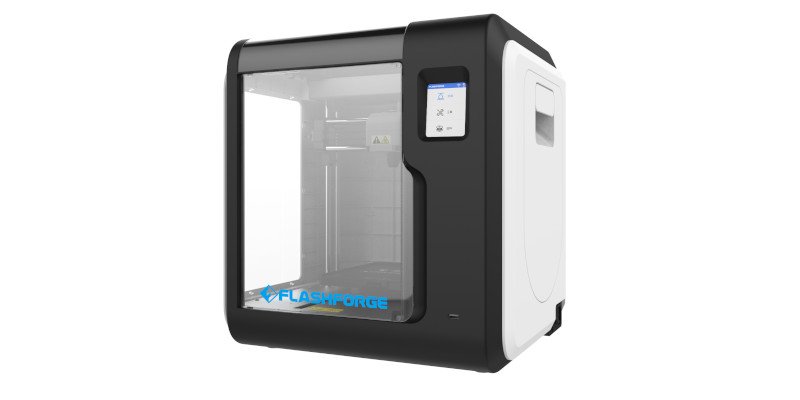
Pros
Reliable and beginner friendly.
WiFi connectivity included.
Can print PLA, ABS, Ultra Strong PLA, PLA color Change, Metal-Filled, Wood, and High Speed PLA.
Cons
Proporietary nozzle assembly is pricey.
A reliable mini 3D printer with a closed build chamber, the Flashforge Adventurer 3 offers good enclosed print conditions ideal for ABS 3D printing.
With a minimum layer height of 50 microns, it’s perfect for 3D printing miniatures and other small models. The closed chamber means that ABS and other filaments will warp less, and all these extras come in a compact 3D printer costing under $500.
The 150 x 150 x 150 mm build volume is small, but I would still not consider this a tiny 3D printer. Most day-to-day projects should be fine, or can be broken up into a few separate prints and glued together.
The nozzle is easily switchable, for example if you want to print faster with a larger nozzle, and overall it is a reliable and low-cost small 3D printer with a closed chamber for effective 3D printing.
Overall, it’s a great compact 3D printer with an enclosure that keeps the heat in, helps prevent warping, and it’s easy to carry around.
This mini 3D printer features a handy 150 x 150 x 150mm build volume, perfect for printing detailed miniatures or splitting bigger projects into pieces.
The enclosed chamber enables easy ABS printing with minimal warping.
With user-friendly WiFi controls, fast print speeds up to 50mm/s, and a budget-friendly price, the Adventurer 3 is the ultimate portable printing powerhouse!
7. Monoprice Voxel
- Price: Check latest price at Amazon here
- Max print size: 150 x 150 x 150 mm
- Max nozzle temperature: 240°C
- Heated bed temperature: 100°C
- Filament compatibility: TPU, PLA, ABS, PETG, Metal/Wood filled PLA
- Total size: 498 x 429 x 513 mm
- Weight: 12.92 kg
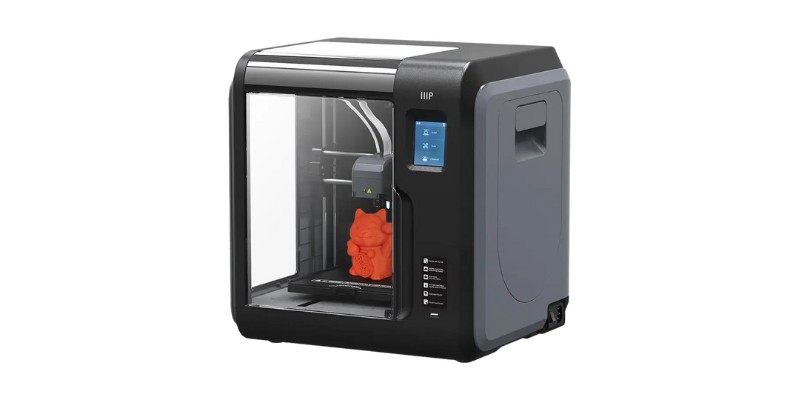
Pros
Modern 3D printer with quality of life features
Good value for the price
Cons
Proprietary nozzle means more expensive replacement costs
The Monoprice Voxel is streamlined and easy to use, but doesn’t skimp on key features. It has a good build volume for a mini 3D printer at 150 x 150 x 150 mm. Plus, the relatively high max nozzle temperature means access to most basic filaments.
Mini 3D printers are commonly designed to be accessible to new hobbyists, and the Voxel is no different. It comes fully assembled, with a touch screen and Wi-Fi connectivity. A quick change nozzle makes it easy to conduct maintenance, without using any tools.
Other quality of life features are offered, too. They include automatic bed leveling, a filament sensor, and automatic feeding. Finally, there’s a heated and removable build plate. It heats up to 60°C and is bendable for simple print removable.
The higher quality nozzle means more filament compatibility. It’s an improvement over the Toybox, though not quite as beginner-friendly.
Loaded with innovations like auto bed leveling, touchscreen controls, and a flexible heated build plate, the Voxel makes printing more accessible than ever.
This modern mini 3D printer delivers a 150 x 150 x 150mm build area for compact creations.
Print like a pro with a nozzle that can handle exotic filaments.
How To Choose a Portable, Compact 3D Printer For Your Desktop
I used four main criteria when putting together this list:
- Size: Had to be a maximum of 200x200x200mm build volume.
- Portable: The 3D printer also needed to be easy to carry around. The enclosed printers are easy to carry around as you can grab onto it, but some also have handles.
- Small overall footprint: Beyond build volume, the 3D printer also needed to have a small total area, so it’ll fit snugly on even a cramped desktop.
- Effective and reliable: Being small shouldn’t mean you sacrifice quality or reliability. I only picked from printers I knew to be excellent.
What Can You 3D Print With a Mini 3D Printer?
You can 3D print models and toys with a mini 3D printer, but you will be very limited by size. Miniatures and small toys, such as fidget toys, pocket whistles, key chains, and articulated animals are all very possible.
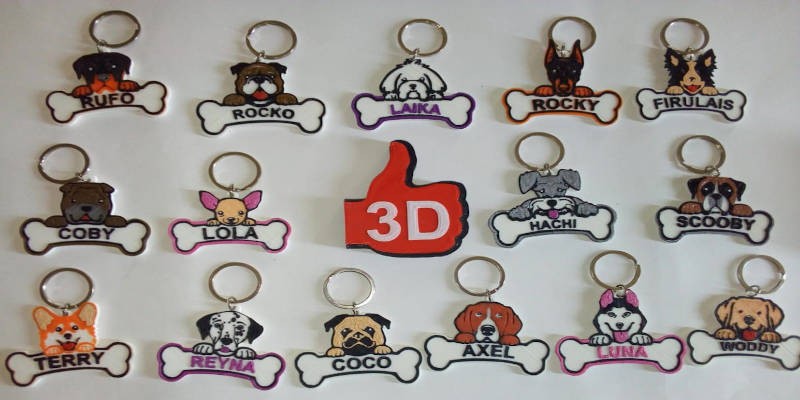
Sadly, you won’t be able to make statuettes with most mini 3D printers. You will also be blocked from making most cosplay pieces aside from tiny ornaments. Even many utility prints, like small shelves or a duct tape dispenser, would be difficult if not impossible.
So, you should think carefully about whether buying a mini 3D printer is a good idea for you. For $100-200 more, you could purchase a larger 3D printer like a Sovol Sv06 or a member of the line.
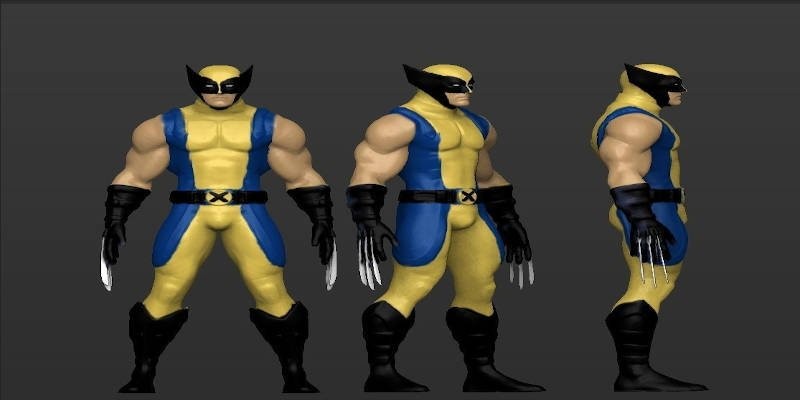
How much do you care about printing more than trinkets, miniatures, and knickknacks. Does your interest in 3D printing expand beyond that? Or is a mini 3D printer the perfect way for you to dip your toes in without committing to something larger?
FAQs
How much does a mini 3D printer cost?
Mini 3D printers can cost as low as $120 for the Ender 2 Pro, and can range up to $500+ for more premium options with advanced features. Generally, good quality small 3D printers, like the Flashforge Finder 3 or Prusa Mini, cost in the $300-400 range.
Can you make money with a small 3D printer?
Yes, you can make money even if you have a small 3D printer. Many models, such as miniature models for games like D&D, are easily printable on 3D printers with smaller working areas.
What build volumes are typical for mini 3D printers?
Anything under the Ender 3’s 220 x 220 x 250 mm build volume is considered a mini 3D printer, and the typical build volume for a mini 3D printer is around 150 x 150 x 150 mm.
On the lower end of the scale, there are models like Toybox, which has a 70 x 80 x 90 mm build volume. Larger models, such as the Prusa Mini+ and Flashforge Finder 3 have 180 x 180 x 180 mm and 190 x 195 x 200 mm build volumes, respectively.
Are small 3D printers good for printing highly detailed models?
No, the smallness of the 3D printer makes no difference in quality when printing highly detailed models. The size of the printer makes no difference, only whether the printer is precise enough to print these details.
Instead, it’s the printing technology and the resolution that determines the level of detail. Resolution is a gauge of the smallest feature or detail a 3D printer can produce on a model, usually measured in XY resolution on resin, or layer height on FDM printers. For example, resin printers offer much better results for high-detail models than FDM printers, regardless of the size of the printer.
Small 3D printers do suit small, detailed models because of their compact size, but there is no quality difference except if lower layer heights and better precisions are available.
How portable are mini 3D printers?
Compared to normal-sized 3D printers, mini 3D printers are extremely portable. They tend to weigh less and have a smaller size and footprint, making them easier to transport and move.
They also often include features that make them more portable, such as handles and pre-assembled delivery.
For example, the Anycubic Photon Mono 2 weighs just 4 kg and has dimensions of 390 x 229 x 235 mm. Similarly, the Prusa Mini+ weighs 4.5 kg and measures 380 × 330 × 380 mm.
What software is recommended for designing models for small print volumes?
The following software is recommended for designing models for small print volumes:
Prusa Slicer (FDM)
Cura (FDM)
Lychee (Resin)
Chitubox (Resin)
Good software for intricate details offers solid orientation options, support generation, and strong overhang performance.
These features all help to bring out the rich features of small models, while also letting you hone in on the smallest details during the slicing process. For miniatures, software like Lychee and Chitubox are among the most popular.
What’s Changed?
Here are the most recent updates we’ve made to this ranking, based on our hands-on tests.
- August and September 2023:
- Removed the Monoprice Select Mini V2, Monoprice Mini Delta, and XYZPrinting Da Vinci as they are no longer as good in 2023.
- Added the Anycubic Photon Mono 2 as our resin recommendation, replacing the Elegoo Mars 2 Pro.
- Updated the Flashforge Finder now that the newer Finder 3 has released.
Jan 2024 updates:
- Updated pricing information for 2024.
What’s Changed
Here are the most recent updates we’ve made to this ranking of the best small 3D printers:
- August and September 2023:
- Removed the Monoprice Select Mini V2, Monoprice Mini Delta, and XYZPrinting Da Vinci as they are no longer as good in 2023.
- Added the Anycubic Photon Mono 2 as our resin recommendation, replacing the Elegoo Mars 2 Pro.
- Updated the Flashforge Finder now that the newer Finder 3 has released.
If you liked this ranking, you may also want to view:
- Our guide to the best FDM 3D printers
- Our guide to the best dual extruder 3D printers
- Our guide to the best large scale 3D printers
- Our 3D pen buyer’s guide
- If you’re a beginner to 3D printing, you may also want to check out our guide to the best 3D printers for beginners
- We also have a ranking of the best 3D printers for kids
- We also have a ranking of the best resin 3D printers
- The fastest 3D printers

